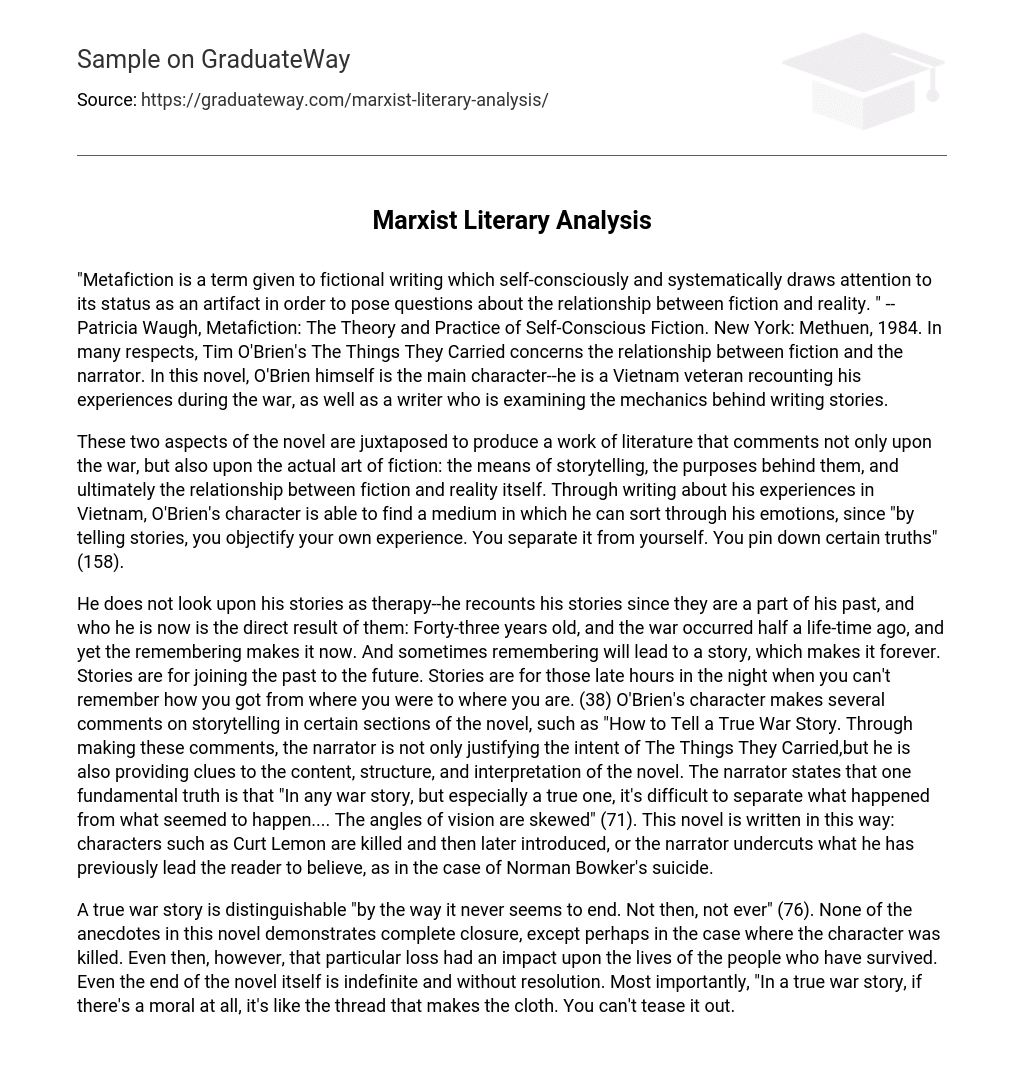The term “metafiction” refers to fictional writing that deliberately calls attention to its nature as an artifact, aiming to explore the connection between fiction and reality. This concept is discussed by Patricia Waugh in her book Metafiction: The Theory and Practice of Self-Conscious Fiction (1984). In Tim O’Brien’s novel The Things They Carried, the narrative focuses on the dynamic between fiction and the narrator. O’Brien, a Vietnam veteran, serves as both the protagonist recounting his war experiences and a writer analyzing the techniques employed in storytelling.
The novel juxtaposes these two aspects to create a literary work that comments on both the war and the art of storytelling. Through his writing about Vietnam, O’Brien’s character finds a way to process his emotions. He believes that storytelling allows him to detach from his experiences and uncover certain truths.
He sees his stories not as therapy but as a reflection of his past and an integral part of his identity. The war, which occurred many years ago when he was just 43, continues to shape him today. Remembering the war often leads to the creation of stories, which have a lasting impact. Stories serve to bridge the gap between the past and the future and provide comfort during late nights when one struggles to comprehend the journey from the past to the present. O’Brien’s character explores storytelling throughout the novel, particularly in “How to Tell a True War Story” section. Within these discussions, the narrator defends The Things They Carried’s purpose and offers hints about its content, structure, and interpretation. One crucial point made is that distinguishing what truly happened from what seemed to happen in war stories is challenging. The novel embraces this perspective by frequently introducing characters who have already perished or contradicting prior beliefs such as Norman Bowker’s suicide.
According to the author, a true war story is easily identified because it never seems to have an end, neither in the past nor in the present (76). None of the stories in this book provide complete closure, except for instances where a character dies. However, even in those cases, their death still has an impact on the lives of the survivors. The novel itself also lacks a definite and resolved ending. The most significant aspect is that, in a true war story, if there is a moral, it is intertwined with the story like a thread that cannot be separated. Extracting the meaning would unravel the deeper significance (77).
The deeper relationship expressed in The Things They Carried is the connection between stories, reality, and time. The narrator, O’Brien, reflects on the concept of time in the section “On the Rainy River,” questioning if the events of that summer occurred in another dimension and where life goes afterwards.
In this section, O’Brien has a profound moment during the lake scene where he sees important people from his past and future on the shore. He describes it as if there is an audience to his life. This scene demonstrates the ability of fiction to surpass the limitations of time, space, and even life and death. Our experiences shape us, and through storytelling, all those who have influenced the narrator’s life are united. As a collective group, they not only observe his life but also reflect the entirety of O’Brien’s existence.
O’Brien states that fiction has the ability to preserve life in the face of death. He explains that during warfare, they were able to keep the deceased alive through stories (239). For the living, stories served as a means to keep the memory of the dead alive, but for the deceased, it was the act of remembering that gave them life. O’Brien emphasizes that storytelling has the power to animate the bodies of the dead and make them speak (232). The story of Linda exemplifies this theme of preservation, as O’Brien uses storytelling and memory to maintain people’s existence: “Stories can save us.”
At the age of forty-three, I have become a writer. Despite this, my dreams still include Linda’s existence, even at present. Although they are all deceased, within storytelling – which can be seen as a type of dreaming – the deceased sometimes display signs of life, like smiling, sitting up, and returning to our world” (225). The main focus of this novel does not center around Vietnam; in fact, it is not about war at all. It revolves around the narrator’s search for a place unaffected by the passage of time. By unraveling the various elements woven throughout this novel, O’Brien’s intentions become clear: he aims to combat physical decay and preserve life by immortalizing it within fiction.
He writes not because of neurosis or therapy, but because he believes that immortality and preservation lie in the memories of people. If the true measure of life is how long we are remembered after we die, then preserving people’s memories through fiction is a way to keep life alive: I will never die. I am quickly moving across the surface of my own history, skating on the thin layer beneath the blades, doing loops and spins. And when I jump into the unknown and land thirty years later, I realize that I am Tim, trying to save Timmy’s life with a story (246). As O’Brien’s life is the culmination of his past relationships with everyone who has been a part of it – past, present, and future – keeping them alive does the same for him. To put it simply, O’Brien writes in order to survive, as through storytelling he can ensure the immortality of all those who were important in his life. It is through their immortality that he has the power to save himself with a simple story.





